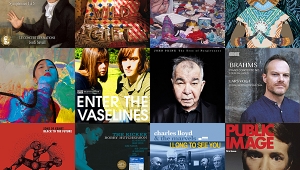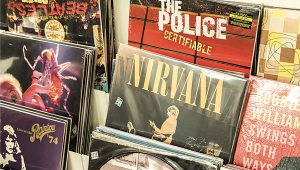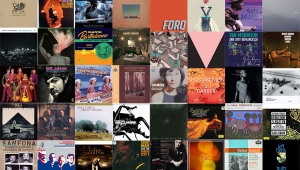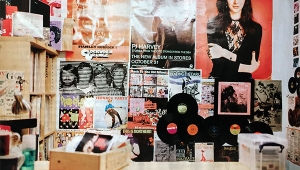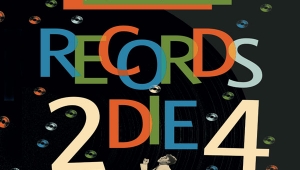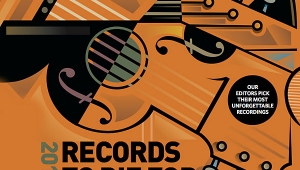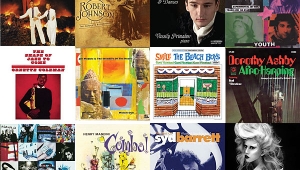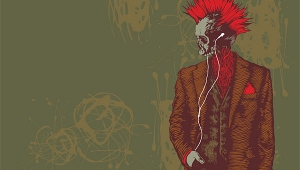| Columns Retired Columns & Blogs |
2005 Records To Die For Page 7
KEITH MOERER
IRON AND WINE: Our Endless Numbered Days
Sub Pop 640 (CD). 2004. Sam Beam, Brian Deck, prods., engs. AAD? TT: 44:49
On the list of people least likely to create great music would have to be a bearded film-studies professor who is also a Miami-based family man. But with Our Endless Numbered Days, Sam Beam, aka Iron and Wine, proved the extraordinary power of his finger-picked acoustic guitar and pure voice, as hushed and intimate as a lover's whisper. The melodies are haunting or beautiful—sometimes both—and Beam's lyrics approach poetry in the best sense of that word. This album contains many highlights, but two of them are "Naked as We Came," the tale of an elderly couple facing death with grace, and the final cut, "Passing Afternoon," which captures the infinite possibility and fleeting happiness suggested by the album's title. Beam is given just enough support—a slide guitar here, a sister's harmonies there—but no more than absolutely necessary. (XXVII-3)
THE CLASH: London Calling (remastered)
Epic EK63885 (CD). 1979/2000. Guy Stevens, prod.; Bill Price, eng. AAD. TT: 64:59
London Calling was an exception—a two-LP set that deserved, practically demanded, every one of its 19 songs. Most everyone knows the call-to-arms title song and the hastily added final track, "Train in Vain," which became a surprise US hit. Just as good are the touching confession of "Lost in the Supermarket," the defiant fist-waver "I'm Not Down," the ominous rumble of "The Guns of Brixton," and half a dozen others. London Calling captures a punk band turning their love of reggae, rockabilly, and R&B into a masterful hybrid all their own. Soon the band members would stumble into the self-indulgent sprawl of Sandinista! , but with London Calling they produced a nearly perfect document that still matters today. (XVI-2)
MILES DAVIS QUINTET: 1965–'68
Miles Davis, trumpet; Wayne Shorter, tenor sax; Herbie Hancock, piano, keyboards; Ron Carter, bass; Tony Williams, drums
Columbia/Legacy 67398 (6 CDs). 1965–68/1997. Irving Townsend, Howard A. Roberts, Teo Macero, orig. prods.; Frank Laico, Fred Plauf, Stan Tonkel, orig. engs.; Michael Cuscuna, Bob Belden, reissue prods. ADD. TT: 7:21:52
As the Beatles were establishing themselves as the all-time greatest pop/rock band, Miles Davis was overseeing the birth and development of the most distinguished quintet in modern jazz. This boxed set is a six-CD gold mine of tunes documenting Davis in his most fertile period, with an extraordinary band starring keyboardist Herbie Hancock, tenor saxophonist Wayne Shorter, bassist Ron Carter, and drummer Tony Williams—all young and relatively inexperienced at the time, yet destined for greatness. The first three discs are Miles acoustic, while the next three find him entering the electronic realm, step by step. The leader's abstract, deeply personal playing commands center stage as he sketches on the fringes of the melodies. Equally captivating are the contributions of all the quintet members—especially Hancock, as he begins to experiment with various electric keyboard sounds—who thrive in these highly creative studio settings. (XXI-5)
PAUL SIMON: Graceland
Warner Bros. 46430-2 (CD). 1986/1996. Paul Simon, prod.; Roy Halee, eng. AAD. TT: 54:00
This year's nine-CD brick, Paul Simon's The Studio Recordings 1972–2000 (Warner Bros./Rhino R2 78909), reveals him as one of pop's most artistic and imaginative singer-songwriters. His songs exude pathos and humor, romanticism and anger, paranoia and faith. Pivotal in the boxed set is the hit-maker and deep thinker's 1986 milestone, Graceland, which pioneered a revolution in pop and world music. Recorded when Simon's career was waning, Graceland proved to be not only his vibrant musical reawakening but also his masterwork. This brilliant collection is indebted to South African township jive (mbaqanga), with dollops of Zydeco thrown in for spice. With a full cast of African musicians starring Ladysmith Black Mambazo, and such significant guests as Los Lobos, Good Rockin' Dopsie, and Linda Ronstadt, Simon cooks up an enthralling percussive party. There isn't a subpar song on the disc, which sounds as fresh today as the year it was issued.
STEVE SWALLOW/OHAD TALMOR SEXTET: L'histoire du Clochard (The Bum's Tale)
Ohad Talmor, tenor sax; Steve Swallow, bass; Gregg Tardy, clarinet; Russ Johnson, trumpet; Jacob Garchik, trombone; Meg Okura, violin
Palmetto PM 2103 (CD). 2004. Matt Balitsaris, prod., eng.; Jim Hildenberger, eng. DDD. TT: 48:13
Technically, this is the Steve Swallow Sextet playing Ohad Talmor's arrangements of six Swallow compositions—but that scants Talmor's achievement. The concept: Take Swallow's compositions and arrange them for a sextet inspired by Stravinsky's L'histoire du soldat, substituting Swallow's electric bass for the original's double bass and Talmor's tenor sax for bassoon. In the hands of these musicians, it's a hymn to timbre—Swallow's silky wail counterbalances a wash of woodwind sonorities and a dusky violin. Who could ever have guessed these instruments could work so well together? Ohad Talmor, obviously, which is why he deserves equal billing.
DOUG HILSINGER WITH CAROLEEN BEATTY: Brian Eno's Taking Tiger Mountain (by Strategy)
DBK Works dbk 111 (CD). 2004. Doug Hilsinger, prod., eng. DDD. TT: 58:49
Hilsinger and Beatty, members of Waycross, so much liked Brian Eno's 1974 album, Taking Tiger Mountain (by Strategy) , that they recorded it themselves—with Hilsinger playing all of the instruments (including "real" drums). At a Long Now lecture, the pair gave Eno a CD-R of their project. Eno describes listening to the Hilsinger-Beatty TTMBS as "an unexpectedly moving experience." I concur. This one rocks harder than the original and it sounds great, except for a small degree of that unmistakable ProTools glassiness. These days, I have a hard time deciding which TTMBS to play. Hilsinger, buoyed by Eno's praise, says, "Sometimes life works." So does this tribute.
THELONIOUS MONK: Brilliant Corners
Thelonious Monk, piano; Ernie Henry, alto sax; Sonny Rollins, tenor sax; Clark Terry, trumpet; Oscar Pettiford, Paul Chambers, bass; Max Roach, drums
Riverside/Analogue Productions RLP 12-226 (LP). 1956/2004. Orrin Keepnews, Bill Grauer, prods., Jack Higgins, eng. AAA. TT: 42:37
Here is my blanket recommendation of all of Analogue Productions' 45rpm jazz vinyl reissues. Record collectors always argue about the relative merits of reissues vs originals. With the Analogue Productions series, it is much more clear-cut. The 33rpms sound damn close to the originals, only with quieter surfaces. The 45s, however, are in another league. Of the two dozen I've sampled, every one reveals drop-dead transparency, detail, and a sense of bloom that is reminiscent of a studio master tape. My favorite is this, Monk's third Riverside album. Although the recording emphasizes Monk's originals in horn-ensemble settings, I'm hooked on his solo reading of the standard "I Surrender Dear." Even on affordable speakers, Monk's right there in the room with me.
BRIAN WILSON: SMiLE
Nonesuch 79846-2 (CD). 2004. Brian Wilson, prod., mix; Mark Linett, eng.; Kevin Deane, Daneil S. McCoy, Pete Magdaleno, asst. engs.; Darian Sahanaja, mix. AAD? TT: 47:01
After 37 years, Brian Wilson's three-part suite has finally been recorded with a top-notch band, as Wilson had originally intended. Beach Boys fans will appreciate the silky vocal harmonies and Van Dyke Parks' borderline-silly lyrics. Those who never understood Wilson's genius will discover a carefully crafted and ingeniously orchestrated gumbo that coheres without a trace of rough edge, dead spot, or spurious fluff, just as the best classical and jazz orchestral works do. Prior to the start of a recent performance of SMiLE at Carnegie Hall, a friend of mine asked me to describe the music. I said: "Imagine listening to Mozart, Varèse, and King Crimson simultaneously." He smiled as the piece progressed and he understood my point. I smile every time I play the CD. (XXVII-12)
IRON AND WINE: Our Endless Numbered Days
Sub Pop 640 (CD). 2004. Sam Beam, Brian Deck, prods., engs. AAD? TT: 44:49
On the list of people least likely to create great music would have to be a bearded film-studies professor who is also a Miami-based family man. But with Our Endless Numbered Days, Sam Beam, aka Iron and Wine, proved the extraordinary power of his finger-picked acoustic guitar and pure voice, as hushed and intimate as a lover's whisper. The melodies are haunting or beautiful—sometimes both—and Beam's lyrics approach poetry in the best sense of that word. This album contains many highlights, but two of them are "Naked as We Came," the tale of an elderly couple facing death with grace, and the final cut, "Passing Afternoon," which captures the infinite possibility and fleeting happiness suggested by the album's title. Beam is given just enough support—a slide guitar here, a sister's harmonies there—but no more than absolutely necessary. (XXVII-3)
THE CLASH: London Calling (remastered)
Epic EK63885 (CD). 1979/2000. Guy Stevens, prod.; Bill Price, eng. AAD. TT: 64:59
London Calling was an exception—a two-LP set that deserved, practically demanded, every one of its 19 songs. Most everyone knows the call-to-arms title song and the hastily added final track, "Train in Vain," which became a surprise US hit. Just as good are the touching confession of "Lost in the Supermarket," the defiant fist-waver "I'm Not Down," the ominous rumble of "The Guns of Brixton," and half a dozen others. London Calling captures a punk band turning their love of reggae, rockabilly, and R&B into a masterful hybrid all their own. Soon the band members would stumble into the self-indulgent sprawl of Sandinista! , but with London Calling they produced a nearly perfect document that still matters today. (XVI-2)
DAN OUELLETTE
MILES DAVIS QUINTET: 1965–'68
Miles Davis, trumpet; Wayne Shorter, tenor sax; Herbie Hancock, piano, keyboards; Ron Carter, bass; Tony Williams, drums
Columbia/Legacy 67398 (6 CDs). 1965–68/1997. Irving Townsend, Howard A. Roberts, Teo Macero, orig. prods.; Frank Laico, Fred Plauf, Stan Tonkel, orig. engs.; Michael Cuscuna, Bob Belden, reissue prods. ADD. TT: 7:21:52
As the Beatles were establishing themselves as the all-time greatest pop/rock band, Miles Davis was overseeing the birth and development of the most distinguished quintet in modern jazz. This boxed set is a six-CD gold mine of tunes documenting Davis in his most fertile period, with an extraordinary band starring keyboardist Herbie Hancock, tenor saxophonist Wayne Shorter, bassist Ron Carter, and drummer Tony Williams—all young and relatively inexperienced at the time, yet destined for greatness. The first three discs are Miles acoustic, while the next three find him entering the electronic realm, step by step. The leader's abstract, deeply personal playing commands center stage as he sketches on the fringes of the melodies. Equally captivating are the contributions of all the quintet members—especially Hancock, as he begins to experiment with various electric keyboard sounds—who thrive in these highly creative studio settings. (XXI-5)
PAUL SIMON: Graceland
Warner Bros. 46430-2 (CD). 1986/1996. Paul Simon, prod.; Roy Halee, eng. AAD. TT: 54:00
This year's nine-CD brick, Paul Simon's The Studio Recordings 1972–2000 (Warner Bros./Rhino R2 78909), reveals him as one of pop's most artistic and imaginative singer-songwriters. His songs exude pathos and humor, romanticism and anger, paranoia and faith. Pivotal in the boxed set is the hit-maker and deep thinker's 1986 milestone, Graceland, which pioneered a revolution in pop and world music. Recorded when Simon's career was waning, Graceland proved to be not only his vibrant musical reawakening but also his masterwork. This brilliant collection is indebted to South African township jive (mbaqanga), with dollops of Zydeco thrown in for spice. With a full cast of African musicians starring Ladysmith Black Mambazo, and such significant guests as Los Lobos, Good Rockin' Dopsie, and Linda Ronstadt, Simon cooks up an enthralling percussive party. There isn't a subpar song on the disc, which sounds as fresh today as the year it was issued.
WES PHILLIPS
STEVE SWALLOW/OHAD TALMOR SEXTET: L'histoire du Clochard (The Bum's Tale)
Ohad Talmor, tenor sax; Steve Swallow, bass; Gregg Tardy, clarinet; Russ Johnson, trumpet; Jacob Garchik, trombone; Meg Okura, violin
Palmetto PM 2103 (CD). 2004. Matt Balitsaris, prod., eng.; Jim Hildenberger, eng. DDD. TT: 48:13
Technically, this is the Steve Swallow Sextet playing Ohad Talmor's arrangements of six Swallow compositions—but that scants Talmor's achievement. The concept: Take Swallow's compositions and arrange them for a sextet inspired by Stravinsky's L'histoire du soldat, substituting Swallow's electric bass for the original's double bass and Talmor's tenor sax for bassoon. In the hands of these musicians, it's a hymn to timbre—Swallow's silky wail counterbalances a wash of woodwind sonorities and a dusky violin. Who could ever have guessed these instruments could work so well together? Ohad Talmor, obviously, which is why he deserves equal billing.
DOUG HILSINGER WITH CAROLEEN BEATTY: Brian Eno's Taking Tiger Mountain (by Strategy)
DBK Works dbk 111 (CD). 2004. Doug Hilsinger, prod., eng. DDD. TT: 58:49
Hilsinger and Beatty, members of Waycross, so much liked Brian Eno's 1974 album, Taking Tiger Mountain (by Strategy) , that they recorded it themselves—with Hilsinger playing all of the instruments (including "real" drums). At a Long Now lecture, the pair gave Eno a CD-R of their project. Eno describes listening to the Hilsinger-Beatty TTMBS as "an unexpectedly moving experience." I concur. This one rocks harder than the original and it sounds great, except for a small degree of that unmistakable ProTools glassiness. These days, I have a hard time deciding which TTMBS to play. Hilsinger, buoyed by Eno's praise, says, "Sometimes life works." So does this tribute.
ROBERT J. REINA
THELONIOUS MONK: Brilliant Corners
Thelonious Monk, piano; Ernie Henry, alto sax; Sonny Rollins, tenor sax; Clark Terry, trumpet; Oscar Pettiford, Paul Chambers, bass; Max Roach, drums
Riverside/Analogue Productions RLP 12-226 (LP). 1956/2004. Orrin Keepnews, Bill Grauer, prods., Jack Higgins, eng. AAA. TT: 42:37
Here is my blanket recommendation of all of Analogue Productions' 45rpm jazz vinyl reissues. Record collectors always argue about the relative merits of reissues vs originals. With the Analogue Productions series, it is much more clear-cut. The 33rpms sound damn close to the originals, only with quieter surfaces. The 45s, however, are in another league. Of the two dozen I've sampled, every one reveals drop-dead transparency, detail, and a sense of bloom that is reminiscent of a studio master tape. My favorite is this, Monk's third Riverside album. Although the recording emphasizes Monk's originals in horn-ensemble settings, I'm hooked on his solo reading of the standard "I Surrender Dear." Even on affordable speakers, Monk's right there in the room with me.
BRIAN WILSON: SMiLE
Nonesuch 79846-2 (CD). 2004. Brian Wilson, prod., mix; Mark Linett, eng.; Kevin Deane, Daneil S. McCoy, Pete Magdaleno, asst. engs.; Darian Sahanaja, mix. AAD? TT: 47:01
After 37 years, Brian Wilson's three-part suite has finally been recorded with a top-notch band, as Wilson had originally intended. Beach Boys fans will appreciate the silky vocal harmonies and Van Dyke Parks' borderline-silly lyrics. Those who never understood Wilson's genius will discover a carefully crafted and ingeniously orchestrated gumbo that coheres without a trace of rough edge, dead spot, or spurious fluff, just as the best classical and jazz orchestral works do. Prior to the start of a recent performance of SMiLE at Carnegie Hall, a friend of mine asked me to describe the music. I said: "Imagine listening to Mozart, Varèse, and King Crimson simultaneously." He smiled as the piece progressed and he understood my point. I smile every time I play the CD. (XXVII-12)
- Log in or register to post comments

